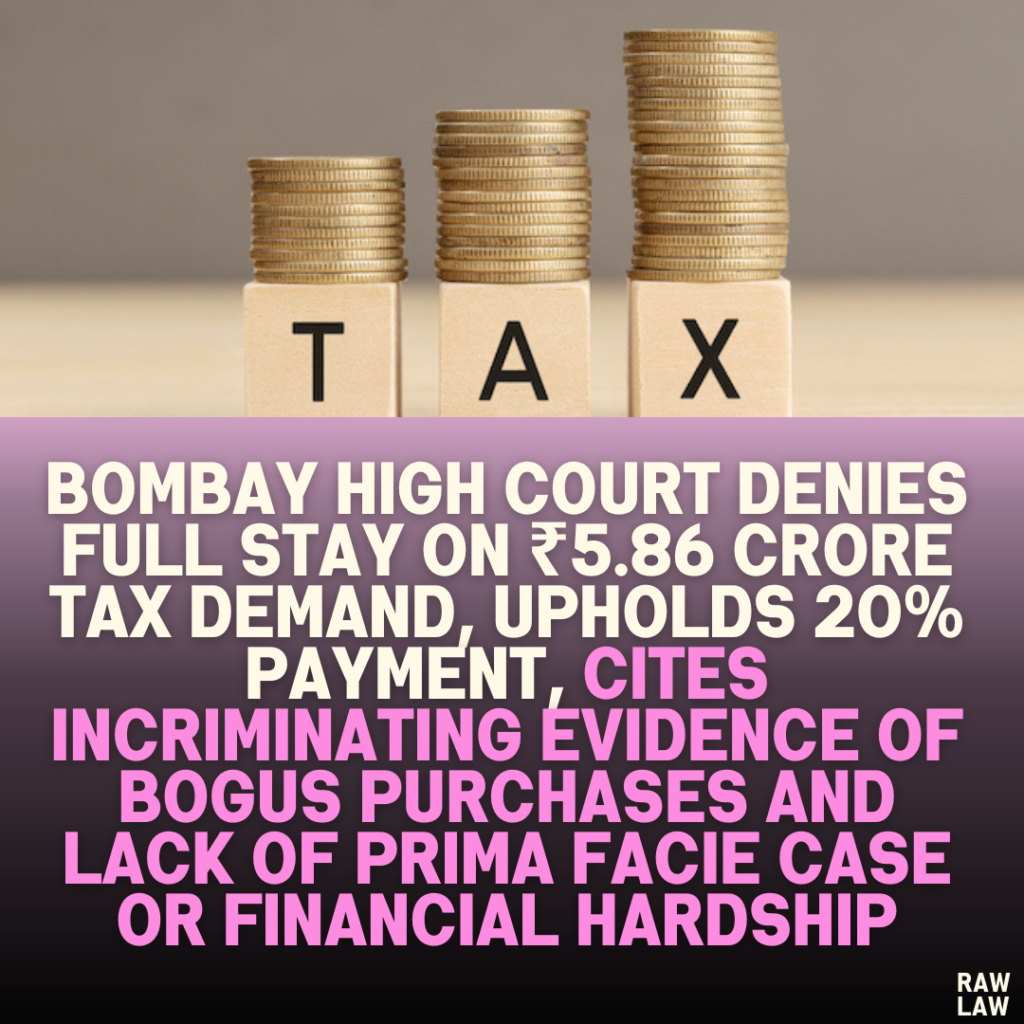Court’s Decision
The Bombay High Court dismissed a writ petition filed by a taxpayer challenging the rejection of a complete stay on a tax demand of ₹5.86 crore. The court upheld the orders of the tax authorities, which directed the petitioner to pay 20% of the demand in installments, stating that:
- The petitioner failed to establish a prima facie case.
- No evidence of financial incapacity to pay was provided.
- The demand was based on detailed investigations and was not arbitrary.
Facts
- Business and Tax Proceedings:
- The petitioner is engaged in the business of manufacturing MS Billets.
- The petitioner filed an income tax return for the Assessment Year 2021-22, declaring a total income of ₹7.52 crore.
- Search and Assessment:
- A search and seizure operation conducted at the petitioner’s premises revealed evidence of bogus purchases amounting to ₹15.86 crore.
- Based on the findings, the Assessing Officer (AO) revised the income to ₹23.39 crore, raising a tax demand of ₹5.86 crore.
- Appeals and Applications:
- The petitioner filed an appeal challenging the assessment order, which remains pending.
- Concurrently, the petitioner submitted applications to the Assistant Commissioner of Income Tax (ACIT) and the Principal Commissioner of Income Tax (PCIT) seeking a complete stay on the demand.
- Orders by Tax Authorities:
- The ACIT rejected the request for a complete stay, directing the petitioner to pay 20% of the demand (₹1.17 crore).
- The PCIT allowed payment of ₹1.17 crore in six installments but rejected the petitioner’s subsequent applications for further relief.
Issues
- Whether the petitioner established a prima facie case to warrant a full stay of the tax demand.
- Whether the tax demand based on findings of bogus purchases was legally and procedurally justified.
Petitioner’s Arguments
- Prima Facie Case:
- The petitioner argued that the additions made in the assessment order were not justified and that similar cases had been decided in favor of taxpayers in the past.
- Undue Hardship:
- Enforcing the payment of 20% of the demand, amounting to ₹1.17 crore, would cause financial hardship.
- Precedents:
- The petitioner claimed that the issue of bogus purchases was covered by decisions of the court in other cases where similar additions were deleted.
- Gross Profit Additions:
- It was argued that at most, additions should have been restricted to the gross profit element of the purchases, not the entire amount.
Respondent’s Arguments
- Evidence of Bogus Purchases:
- The respondents highlighted that the tax authorities relied on substantial evidence, including documents seized during the search and statements from third parties, to establish that the purchases were non-genuine.
- Failure to Comply:
- Despite being allowed to pay the demand in installments, the petitioner failed to make any payment to date.
- Delaying Tactics:
- The respondents contended that the petitioner was filing repetitive applications to delay recovery proceedings.
- Strong Case for Additions:
- The findings in the assessment order were based on detailed investigations, making the additions legally and factually robust.
Analysis of the Law
- Assessment Order:
- The court examined the assessment order, which provided detailed reasoning for treating purchases as bogus, including:
- Evidence collected during the search operation.
- Statements of suppliers indicating the non-genuine nature of transactions.
- Failure of the petitioner to rebut these findings effectively.
- The court examined the assessment order, which provided detailed reasoning for treating purchases as bogus, including:
- Prima Facie Case:
- To justify a stay of tax demand, a petitioner must establish:
- A prima facie case in their favor.
- Evidence of financial incapacity to pay.
- The balance of convenience leaning towards the petitioner.
- The court held that the petitioner failed to satisfy these criteria.
- To justify a stay of tax demand, a petitioner must establish:
- Gross Profit Argument:
- The petitioner’s argument that only gross profit additions should be made was rejected. The court clarified that allowing deductions for non-genuine purchases would contravene statutory provisions prohibiting unexplained expenditure.
Precedent Analysis
- The court emphasized that the genuineness of purchases is a factual matter to be determined case by case.
- The petitioner did not provide any binding precedents directly applicable to the facts of the case. The claim of prior favorable decisions remained unsupported.
Court’s Reasoning
- Failure to Establish Prima Facie Case:
- The petitioner did not provide any evidence to rebut the findings of the tax authorities.
- The court found the additions to be based on thorough investigations and incriminating material.
- No Evidence of Financial Incapacity:
- The petitioner failed to submit documents proving financial hardship or an inability to pay 20% of the demand.
- Delay Tactics:
- The court observed that repeated applications for relief without addressing the substantive issues were aimed at delaying recovery proceedings.
- Merit of Additions:
- The additions were justified based on incriminating evidence and findings from the search operation.
Conclusion
The High Court dismissed the petition, stating:
- The petitioner had not demonstrated any grounds for a full stay of the tax demand.
- Observations made in the order were limited to the issue of stay and would not affect the merits of the pending appeal.
- The petitioner must comply with the demand payment as directed by the tax authorities.
Implications
- Taxpayer Obligations:
- Taxpayers seeking relief from tax demands must present strong evidence of a prima facie case and financial hardship.
- Role of Investigations:
- Findings from searches and detailed investigations play a critical role in sustaining tax demands.
- Judicial Approach to Delay Tactics:
- Repeated applications to delay recovery are likely to be dismissed without merit.
This decision reinforces the principle that tax demands based on substantial evidence cannot be easily stayed, and taxpayers must present compelling grounds for relief.



